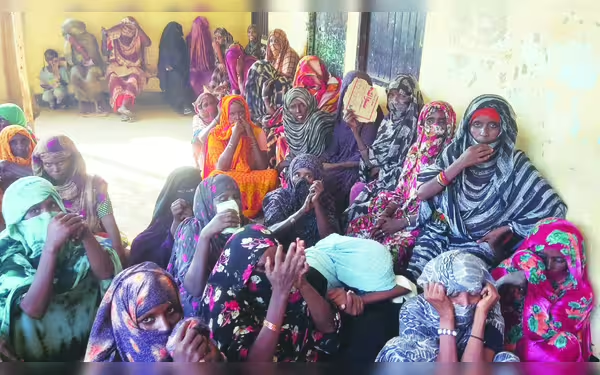Saturday, November 16, 2024 05:32 PM
Sudan War Victims: Medical Charity Highlights Dire Humanitarian Crisis
- Sudan faces the world's largest displacement crisis.
- MSF halts nutrition activities due to severe shortages.
- Women and children are particularly vulnerable in this conflict.
 Image Credits: arabnewspk
Image Credits: arabnewspkMedical charity MSF reveals the dire humanitarian crisis in Sudan amid ongoing conflict and severe food insecurity.
The ongoing civil war in Sudan has plunged the nation into a humanitarian crisis of unprecedented proportions. Since the conflict erupted in April last year, the violence between the Sudanese military and the Rapid Support Forces (RSF) has resulted in the deaths of tens of thousands and has created the world’s largest displacement crisis. With millions of people now facing severe food insecurity, the situation has become dire, prompting urgent calls for humanitarian access to the affected regions.
Medical charity Medecins Sans Frontieres (MSF), also known as Doctors Without Borders, has been one of the few international organizations still operating in Sudan. During a recent briefing in Nairobi, MSF coordinator Claire San Filippo painted a grim picture of the conditions faced by the people of Sudan. "We’re not talking about an emergency anymore. We’re talking about a nightmare," she stated, highlighting the alarming rates of malnutrition that have emerged as a result of the ongoing conflict.
San Filippo shared a harrowing account of a mother of three who fled the violence in El-Fasher, a city in Darfur that has been subjected to intense paramilitary attacks. The mother, who lost eight family members to the conflict, described her experience as a living hell. "She told me war is everywhere. Everywhere, there are killings. Everywhere, there are bombings, shootings," San Filippo recounted. This mother’s journey to safety took a month, during which she faced unimaginable hardships.
According to MSF, the situation in refugee camps is equally alarming. In Zamzam Camp in North Darfur and Nyala in South Darfur, acute malnutrition has been recorded in 32 percent of the population. The ongoing conflict has not only led to a lack of food and water but has also severely impacted access to primary healthcare. San Filippo noted that many of the refugees are women and children, who are particularly vulnerable in this crisis.
Both the Sudanese military and the RSF have been accused of committing atrocities against civilians, including indiscriminate shelling and blocking aid. These actions have forced MSF to make the heartbreaking decision to halt nutrition activities in Zamzam Camp, where famine has been declared. "As supplies run low, we had no choice but to stop caring for 5,000 children," San Filippo lamented.
The situation is further exacerbated by the looting and occupation of healthcare facilities in Khartoum and El-Fasher. Medical workers have faced harassment and violence, making it increasingly difficult to provide care to those in need. Dr. Lisa Searle, who worked in Khartoum, described waking up to the sound of heavy machine gunfire, emphasizing the trauma experienced by both medical staff and the communities they serve.
The plight of the Sudanese people is a stark reminder of the devastating impact of war on innocent lives. As the conflict continues, the international community must rally to support humanitarian efforts and ensure that aid reaches those who need it most. The stories of resilience and suffering from Sudan should not be forgotten, and it is imperative that we advocate for peace and stability in the region. Only through collective action can we hope to alleviate the suffering and restore hope to the people of Sudan.













